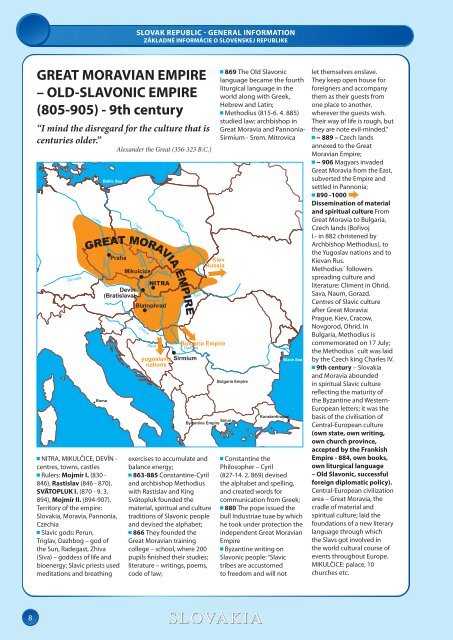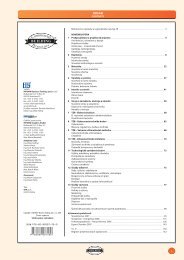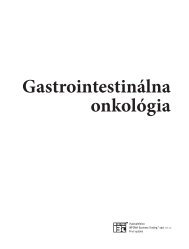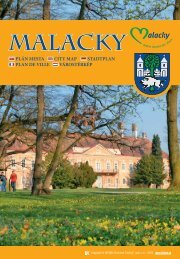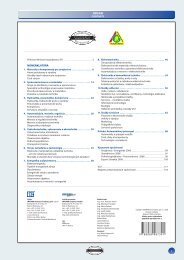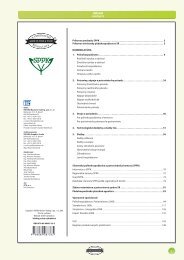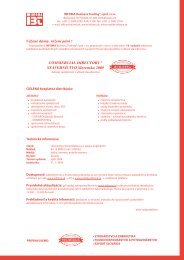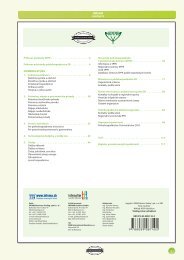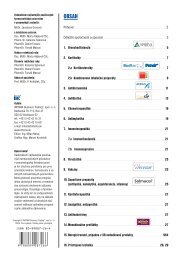OLD-SLAVONIC EMPIRE - INFOMA
OLD-SLAVONIC EMPIRE - INFOMA
OLD-SLAVONIC EMPIRE - INFOMA
You also want an ePaper? Increase the reach of your titles
YUMPU automatically turns print PDFs into web optimized ePapers that Google loves.
8<br />
GREAT MORAVIAN <strong>EMPIRE</strong><br />
– <strong>OLD</strong>-<strong>SLAVONIC</strong> <strong>EMPIRE</strong><br />
(805-905) - 9th century<br />
“I mind the disregard for the culture that is<br />
centuries older.”<br />
Alexander the Great (356-323 B.C.)<br />
Danube<br />
Labe<br />
Roma<br />
NITRA, MIKULČICE, DEVÍN -<br />
centres, towns, castles<br />
Rulers: Mojmír I. (830 -<br />
846), Rastislav (846 - 870),<br />
SVÄTOPLUK I. (870 - 9. 3.<br />
894), Mojmír II. (894-907).<br />
Territory of the empire:<br />
Slovakia, Moravia, Pannonia,<br />
Czechia<br />
Slavic gods: Perun,<br />
Triglav, Dazhbog – god of<br />
the Sun, Radegast, Zhiva<br />
(Siva) – goddess of life and<br />
bioenergy; Slavic priests used<br />
meditations and breathing<br />
Vltava<br />
Baltic Sea<br />
SLOVAK REPUBLIC - GENERAL INFORMATION<br />
ZÁKLADNÉ INFORMÁCIE O SLOVENSKEJ REPUBLIKE<br />
Odra<br />
Morava<br />
Mikulcice<br />
Váh<br />
Drava<br />
Sava<br />
Váh<br />
Wisla<br />
GREAT MORAVIA <strong>EMPIRE</strong><br />
Praha<br />
NITRA<br />
Devín<br />
(Bratislava)<br />
Danube<br />
Blatnohrad<br />
yugoslavia<br />
nations<br />
Wisla<br />
Danube<br />
Sirmium<br />
Tisa<br />
Kiev<br />
Russia<br />
Bulgaria Empire<br />
Bulgaria Empire<br />
Solun<br />
Byzantine Empire<br />
exercises to accumulate and<br />
balance energy;<br />
863-885 Constantine-Cyril<br />
and archbishop Methodius<br />
with Rastislav and King<br />
Svätopluk founded the<br />
material, spiritual and culture<br />
traditions of Slavonic people<br />
and devised the alphabet;<br />
866 They founded the<br />
Great Moravian training<br />
college – school, where 200<br />
pupils fi nished their studies;<br />
literature – writings, poems,<br />
code of law;<br />
869 The Old Slavonic<br />
language became the fourth<br />
liturgical language in the<br />
world along with Greek,<br />
Hebrew and Latin;<br />
Methodius (815-6. 4. 885)<br />
studied law; archbishop in<br />
Great Moravia and Pannonia-<br />
Sirmium - Srem. Mitrovica<br />
Konstantinopol<br />
Black Sea<br />
Constantine the<br />
Philosopher – Cyril<br />
(827-14. 2. 869) devised<br />
the alphabet and spelling,<br />
and created words for<br />
communication from Greek;<br />
880 The pope issued the<br />
bull Industriae tuae by which<br />
he took under protection the<br />
independent Great Moravian<br />
Empire<br />
Byzantine writing on<br />
Slavonic people: “Slavic<br />
tribes are accustomed<br />
to freedom and will not<br />
let themselves enslave.<br />
They keep open house for<br />
foreigners and accompany<br />
them as their guests from<br />
one place to another,<br />
wherever the guests wish.<br />
Their way of life is rough, but<br />
they are note evil-minded.”<br />
~ 889 – Czech lands<br />
annexed to the Great<br />
Moravian Empire;<br />
~ 906 Magyars invaded<br />
Great Moravia from the East,<br />
subverted the Empire and<br />
settled in Pannonia;<br />
890 -1000<br />
Dissemination of material<br />
and spiritual culture From<br />
Great Moravia to Bulgaria,<br />
Czech lands (Bořivoj<br />
I.- in 882 christened by<br />
Archbishop Methodius), to<br />
the Yugoslav nations and to<br />
Kievan Rus.<br />
Methodius´ followers<br />
spreading culture and<br />
literature: Climent in Ohrid,<br />
Sava, Naum, Gorazd.<br />
Centres of Slavic culture<br />
after Great Moravia:<br />
Prague, Kiev, Cracow,<br />
Novgorod, Ohrid. In<br />
Bulgaria, Methodius is<br />
commemorated on 17 July;<br />
the Methodius´ cult was laid<br />
by the Czech king Charles IV.<br />
9th century – Slovakia<br />
and Moravia abounded<br />
in spiritual Slavic culture<br />
refl ecting the maturity of<br />
the Byzantine and Western-<br />
European letters; it was the<br />
basis of the civilisation of<br />
Central-European culture<br />
(own state, own writing,<br />
own church province,<br />
accepted by the Frankish<br />
Empire - 884, own books,<br />
own liturgical language<br />
– Old Slavonic, successful<br />
foreign diplomatic policy).<br />
Central-European civilization<br />
area – Great Moravia, the<br />
cradle of material and<br />
spiritual culture; laid the<br />
foundations of a new literary<br />
language through which<br />
the Slavs got involved in<br />
the world cultural course of<br />
events throughout Europe.<br />
MIKULČICE: palace, 10<br />
churches etc.


